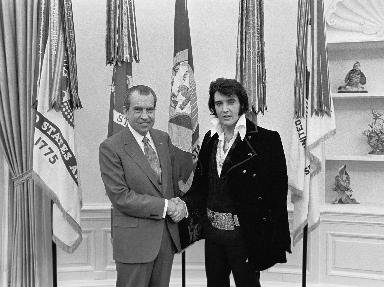Quiz Answer Key and Fun Facts
1. A song written in the late nineteenth century with a title that translates literally to "My Sun", was given new lyrics in 1960 and, arguably, became Elvis' biggest hit. Over the years it had been sung by the greatest tenors including Enrico Caruso and Mario Lanza. Elvis did nothing to denigrate this musical masterpiece, with a fine rendition that topped the Billboard charts for five weeks and reigned supreme on the U.K. and Australian top forties for eight and seven weeks respectively. It has since been performed by numerous artists with a most successful version by singer/actor John Schneider taking the song to number fourteen on Billboard in 1981.
2. Only months after the afore-mentioned huge hit, along came another smash that would almost equal the predecessor's total time at number one. It was another song to stand the test of time and was composed in the mid 1920s. Notable early versions were from "The Original Radio Girl" Vaughn DeLeath and famed tenor Henry Burr, and later by Al Jolson. The spoken part in Elvis' lyrics are loosely based on Shakespeares' "As You Like It" play. The song stayed top of the Australian charts for eight weeks, the U.K.'S for four and Billboard for six.
3. Elvis notched his sixteenth number one on the Billboard charts in less than five years in February 1961 with another old time hit that was originally an Italian song written in 1902 under another dialect. Frank Sinatra sang it under the title "Come Back To Sorrento" in Italian.
4. In 1957 Elvis produced the record of the year in the States which topped all three charts (pop, country and r&b), and stayed on top of Billboard's Top Forty for nine weeks. It was also the U.K.'s first number one hit by Elvis Presley. In Australia, though, it peaked at number five. Elvis, himself, was a lyricist on this composition along with Otis Blackwell. The song was covered by Suzi Quatro in the mid 1970s and by Cliff Richard on his 2001 album "Wanted".
5. In 1956 another Otis Blackwell composition, along with an inseparable flip side smash hit, spent eleven weeks on top of the U.S. charts. It became the first disc to have number one status on both A and B sides. Though peaking at number ten on the Australian Top Forty and number eleven in the U.K., it reached number one in Finland and Brazil.
6. With two feature movies failing to enthuse Elvis' army of fans because of storylines and casting not complimentary to the now "King of rock and roll", along came the svengalis of rock music compositions. Jerry Leiber and Mike Stoller set about writing the main score for an upcoming movie which would not only allow Elvis to perform some great songs, but just as importantly allowed him to show the acting ability previously denied him. The title song of the movie went to the top of the American charts for seven weeks and was number one in the U.K. for three.
7. Elvis recorded several songs for release while serving in the U.S. army. A strong double-sided disc was released twelve months into his military training. It featured a song written by the country legend who persuaded the directors of the Grand Ole Opry to allow a young singer by the name of Elvis Presley to appear on stage way back in 1954. The favour was repaid five years later when the song went to the top of the U.K. charts for five weeks, the Australian Top Forty for two,and got to number two on Billboard.
8. A movie made soon after Elvis' discharge from the army featured a song that really took off in the U.K. and Australia with six weeks and five weeks respectively at number one. However it was not released as a single in the States for three years and consequently failed to register on Billboard. The movie mentioned involved Elvis loosely replicating the work he had been involved in during the previous two years. The song was written by Bert Kaempfert of "Wonderland By Night" fame.
9. A song written by southern singer/songwriter Arthur Glenn for his son Darrell in 1953 became a local hit when taken up by Valley Records out of Knoxville following its rejection by a national publishing house. The song then came to national prominence when a pioneer African/American rythym and blues vocal group recorded it. Sonny Til And The Orioles got the tune to number one on the R.& B. charts for five weeks and number eleven on the Pop lists in 1953. It became a favourite of Elvis' and many years later he went on to record it himself and succeeded in taking it to number one in the U.K. for a fortnight and in Australia for one week, and it peaked at number three on Billboard. The song has been recorded by many top artists including Ella Fitzgerald and Wanda Jackson, and in recent years has become a very unlikely Karaoke favourite.
10. A song written especially for a feature film of the early 1960s was adapted from a French song entitled "Plaisir D'Amour" and when released as a single went to the top of the U.K. and Australian charts for four weeks apiece and reached the number two position in America. One of Elvis' most enduring records, the song has been popular with many artists over the years including an English band who had more success with it than did the King himself.
Source: Author
muffin1708
This quiz was reviewed by FunTrivia editor
agony before going online.
Any errors found in FunTrivia content are routinely corrected through our feedback system.

